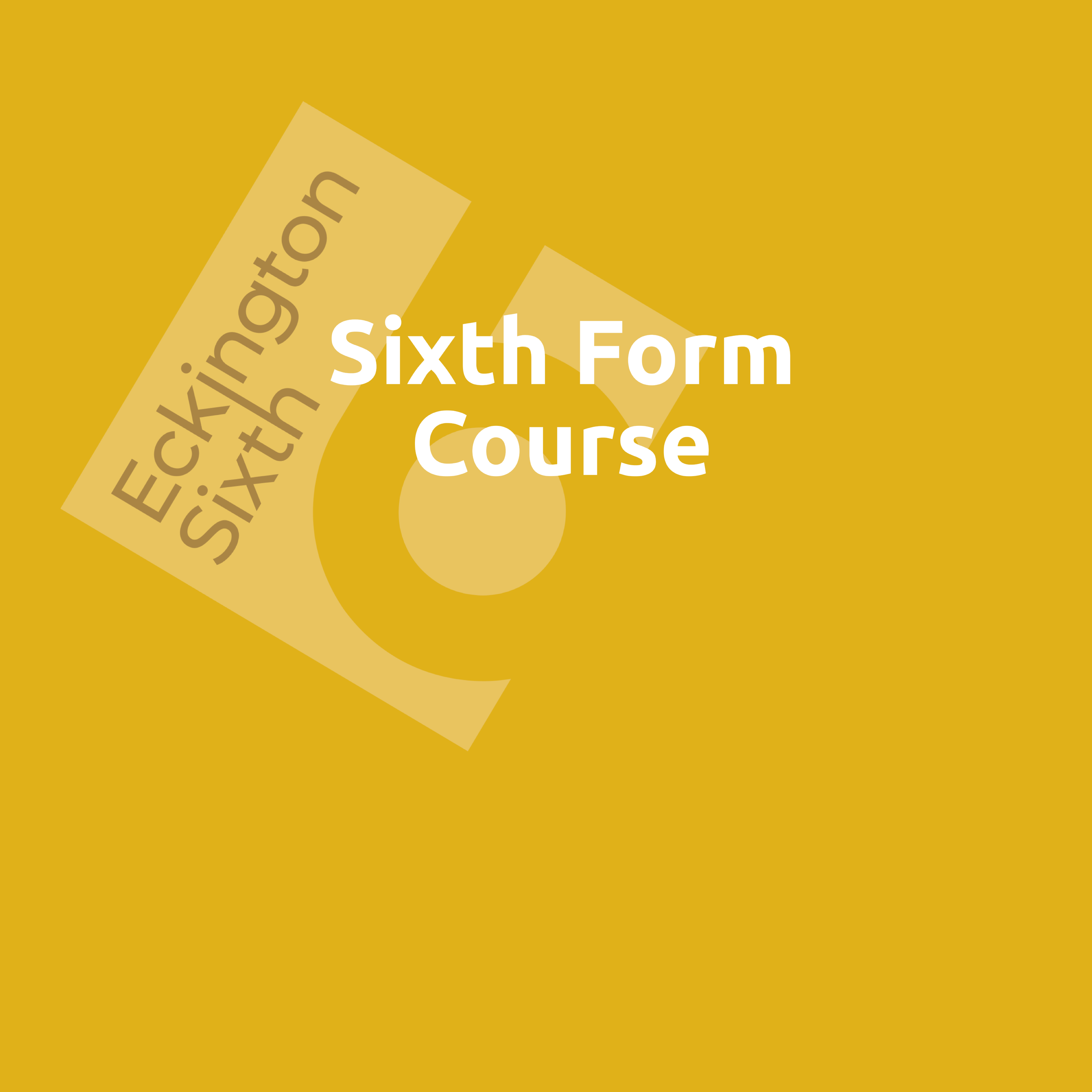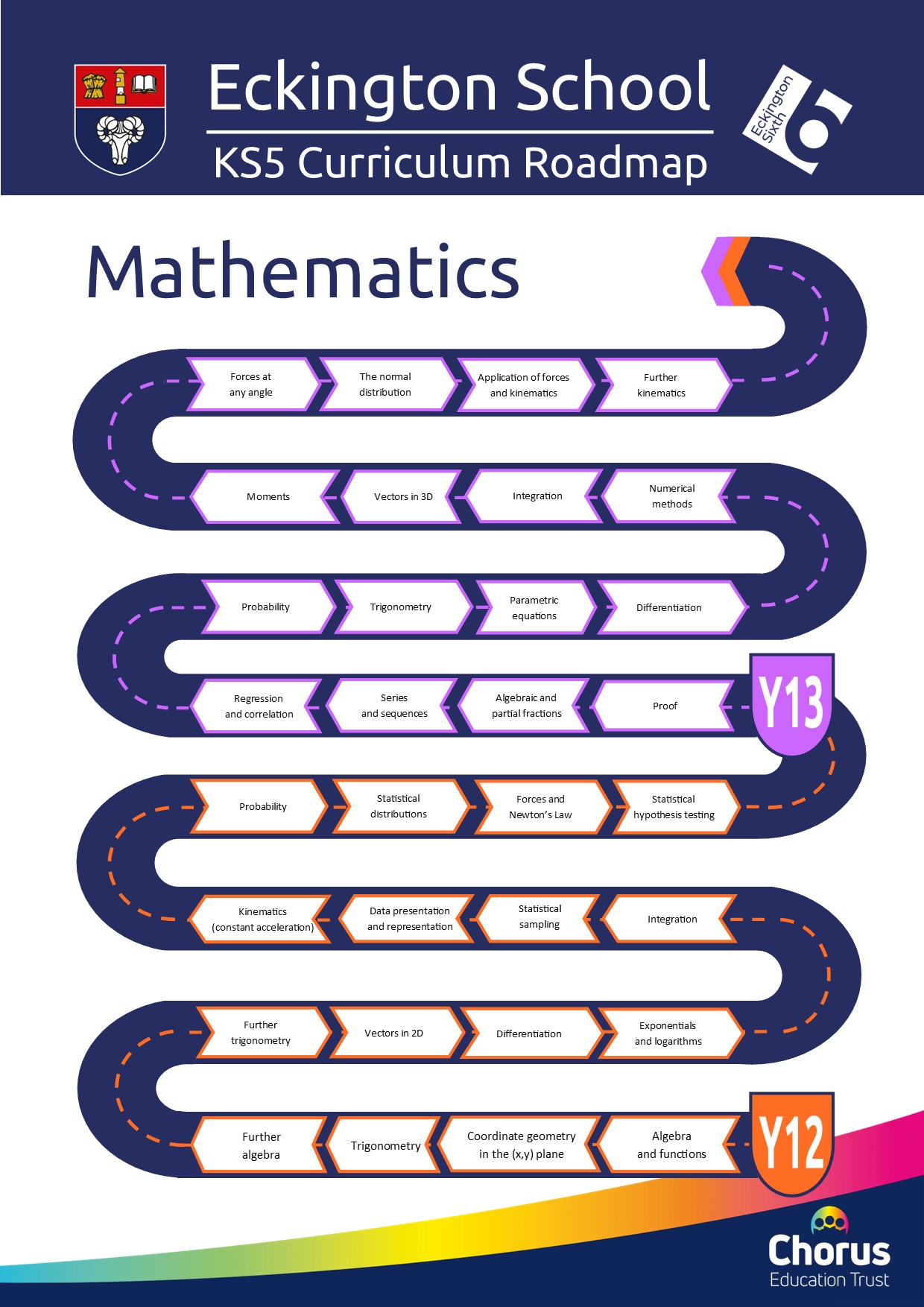Courses
We offer a broad and balanced curriculum, for key stage 3 (Years 7-9), key stage 4 (Years 10 and 11) and key stage 5 (Years 12 and 13 - Sixth Form). Click the appropriate button below to find the details for each subject offered in each key stage.

Overview
Mathematics
Introduction
A-level mathematics is one of the most popular A-levels. At Eckington School, enthusiastic and experienced teachers guide and support students throughout the two-year course. The course builds upon prior learning, extending topics from key stage 4, as well as introducing areas of new mathematics for students to study. Regular topic tests and termly assessments inform the students and teachers of progress being made and the areas in need of more attention. The course is made up of a main core element of pure maths and modules of mechanics and of statistics and these are taught over five lessons per week. The curriculum is ambitious, and we encourage our students to consolidate their learning with independent study as they work hard to achieve their best.
Qualification
A-level
Awarding body
AQA
Course leader
A Burton
Assessment
- Examination: 100%
- 33%: Paper 1 (pure mathematics 1)
- 33%: Paper 2 (pure mathematics 2)
- 33%: Paper 3 (statistics and mechanics)
- Non-examined assessment: n/a
Curriculum
Curriculum roadmap
Topics
- Proof
- Algebra and functions
- Coordinate geometry in the (x, y) plane
- Series and sequences
- Trigonometry
- Exponentials and logarithms
- Differentiation
- Integration
- Numerical methods
- Vectors
- Statistical sampling
- Data presentation and interpretation
- Probability
- Statistical distributions
- Statistical hypothesis testing
- Quantities and units in mechanics
- Kinematics
- Forces and Newton’s laws
- Moments.
Skills and requirements
Subject entry requirements
- A strong Grade 6 in GCSE mathematics.
Sixth Form entry requirements
- 4 A-levels over 2 years: for students who have achieved 5 or more grade 7s or above including English and maths (grade 5 or above).
- 3 A-levels over 2 years: for students who have achieved 5 grade 5s or above including English and maths.
- Level 3 vocational courses: for students who have achieved 5 grade 4s or above including English and maths.
Skills learned
The course will enable students to have the mathematics they need to solve scientific, mechanical, coding, and abstract problems. Along with a knowledge of the topics taught at A-level, students will develop their logical, problem-solving, and analytical thinking skills. These skills are all transferable and can be applied to many different areas of life. In addition, an A-level in mathematics helps students develop research skills used to find solutions to problems and investigate theories.
Beyond the classroom
Future pathways
With an A-level in mathematics you can go on to study mathematics at degree level at university.
A mathematics degree can support you in entering a career in areas such as accounting, medicine, engineering, forensic pathology, finance, business, consultancy, teaching, IT, games development, scientific research, programming, the civil service, design, construction, astrophysics and many more.
The study of mathematics will equip you with many transferable skills and mathematics is a facilitating subject that will support your study in lots of other areas and enable access to many different careers pathways. It supports the study of the sciences, engineering, IT, economics and business. It can even enable you to keep your options open when studied along-side subjects such as English or history.
Maths is one of the best subjects to develop your analytical, research and problem-solving skills. Not only will studying maths help give you the knowledge to tackle scientific, mechanical, coding and abstract problems, it will also help you develop logic to tackle everyday issues like planning projects, managing budgets and even debating effectively.
Earnings, on average, for those with a maths A-level can, over a life time, be greater than for those without.
Research has shown more and more employers are looking for maths graduates and this all begins with an A-level in maths as studying mathematics develops problem solving skills and analytical thinking.




